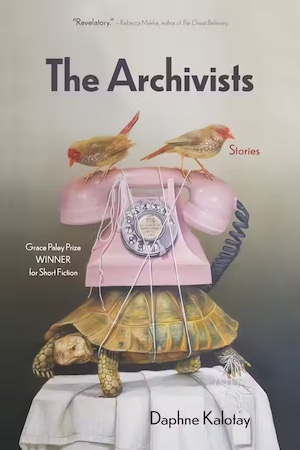By Indira Ganesan
For many years, whenever I taught an Introduction to Creative Writing class to college students, I made sure to show an episode from Julia Child’s The French Chef. Even if my students never wrote again after my class, I wanted to be certain they knew how to make an omelet, to feed themselves. Likewise, Daphne Kalotay’s narrator in my favorite of her story collection, wonderfully titled “A Guide to Lesser Divinities,” tells her students:
“You see, I still believed language, properly employed, might save our careening planet. It’s why I made my bewildered students . . . learn the difference between can and may . . . . [That] the degradation of language set the stage for ethical misjudgment, that . . . careful parsing of word choice . . . were skills to combat despots and charlatans.”
Armed with the correct word, one protects the world from dictators. How can one not like such a writer’s logic? Filled with small truths and big lies, Kalotay’s stories in The Archivists shine with a smartness that earned the Grace Paley Prize in Short Fiction. Like Paley, Kalotay deftly marries fiction with politics in the lives of ordinary people making a living while making sense of their lives. A woman knowingly attends a party where she will see her ex with his new fiancée; a woman tries to outrun her fear as she is harassed by a foul-mouthed man in a truck who follows her jogging; a woman places her confused cousin into a nursing home—these are some of the stories told in this smart, sometimes spooky collection. In that last story, a young girl is hired by Bell Telephone to archive phone line complaints, but she lies about her age, as her aunt instructs her. She is twelve years old when she is hired, a confounding fact that her employer recognizes five years later, as she remains with the company. But the story is not about an underage employee; it is about the trauma of aging and changing residences.
The paradoxes that life offers is a theme explored in these stories that can be read in order, which is one of the small joys of a short story collection. There are hidden delights, like a character named Pierre D. Pierre, a psychic whose services are not wanted by the protagonist of one story. In another story, a caseworker for Holocaust survivors finds an unexpected way to share his own life sorrow with one of his clients. Glimpses of the supernatural are overlaid in the circumstances of a world-wide pandemic, but realism is the backbone of this collection. How do people survive in the most extraordinary circumstances, and how extraordinary are death, sorrow, loss, and grief?
Novelist Indira Ganesan was inducted into Phi Beta Kappa at Vassar College. Her books include The Journey (Alfred A. Knopf, 1990), Inheritance (Alfred A. Knopf, 1998) and As Sweet As Honey (Alfred A. Knopf, 2013).




